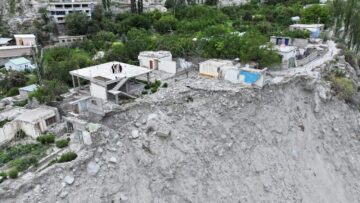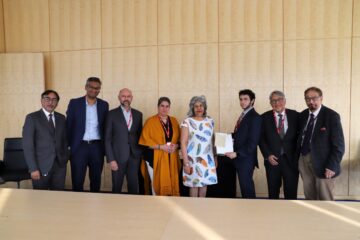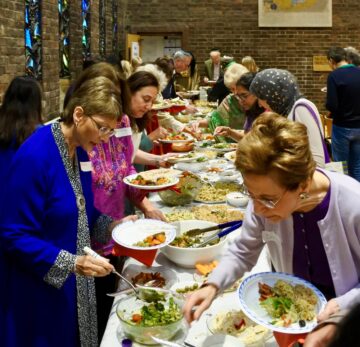To mark this year’s International Education Day, with its theme “Recover and Revitalise Education for the COVID-19 Generation”, students, teachers and programme staff at the IIS’s Department of Graduate Studies reveal the challenges posed by the pandemic, how the Institute’s programmes have responded, and what it’s like to teach and learn under lockdown.
Both IIS graduate programmes, the Secondary Teacher Education Programme (STEP) and the Graduate Programme in Islamic Studies and Humanities (GPISH), employed a blend of face-to-face and online teaching last term, but have since had to move completely online as a result of the most recent lockdown. “One of the challenges has been constantly adjusting to new government guidelines and figuring out how to apply these to the IIS’s fairly unique case,” says Dr Alex Henley, GPISH Programme Leader.
Energy, creativity and extraordinarily hard work
“But it’s also been an exercise in thinking about how we can capitalise on our unique resources to give students more than other institutions can,” Alex adds. Small student numbers, the spacious and well-ventilated teaching environment of the Aga Khan Centre, and nearby accommodation have allowed the Department of Graduate Studies (DGS) to keep Covid-safe facilities and study spaces open even when the rest of London has shut down, he says. “Some staff have gone to extraordinary lengths to travel into work without contributing to the spread of the virus, while the rest of us have stayed home since March to keep our students safe.” Dr Henley pays testament to the “energy, creativity and extraordinarily hard work that’s been put in by DGS staff, lecturers and students over the past year”.
Another challenge was ensuring that incoming students were able to reach the UK for the start of autumn term, according to Kate Holt, Student Services Manager. The importance of this was heightened by various issues of connectivity in several countries where students were having trouble connecting to class. “Thanks to tireless work on the part of DGS and also members of the Aga Khan Centre Estates team, and thanks to the extraordinary patience and tenacity of the students, we were able to get all but two students to the UK by the end of October, with the last two arriving in November and December.”
All together during this difficult time
Once here, students faced quarantine, restrictions on movement and eventually full lockdown, and the Student Services Unit have worked hard to support their wellbeing. Consistent and enhanced communications, from group check-ins to individual follow-ups, have been essential, Kate says. During initial quarantine the team provided daily meals and breakfast boxes, and checked in daily. They have also been sending out regular newsletters with wellbeing tips, as well as suggestions for things to do in London (in and out of lockdown). Alan Wake, Registry and Student Services Officer, has helped to run online events for the students, from an end-of-year quiz to an open-mic night showcasing poetry, singing, comedy, dancing and short stories, which have proved really popular he says. “These events are so important because they allow people to see each other. Although there can be Zoom fatigue, it is always great to see so many people and focus on fun activities, creativity, laughter, a little bit of competitiveness and a feeling that we are all together during this difficult time.”
Barely missed an academic beat
Samira Lakhani is one of the new 2021 cohort on the STEP programme and says that, as a mature student with varying needs, she’s found the IIS approach exemplary. “All the staff and faculty have been so caring and supportive in these very difficult times. Not to mention highly proactive so we barely missed an academic beat.”
To ensure teaching adapted effectively to the pandemic, Faheem Hussein, STEP Teacher Educator, and Dr Roy Wilson, Academic Skills Co-ordinator, have run a number of Zoom workshops on “Effective Online Teaching and Learning”. According to Faheem, through these initiatives, “we are not only responding to the current situation but also re-positioning and re-conceptualising our ways of ‘routine’ teaching practices that are suitable for online platforms.”
Sense of community and problem-solving
The workshops have been attended by IIS staff and Time and Knowledge Nazrana (TKN) volunteers, and have provided a forum for individuals to share their expertise and experiences in teaching online during the Covid-19 crisis. This has allowed people to learn about useful software, platforms and content for enhancing their teaching and learning resources for students. Topics so far have included how to use a Moodle, platforms such as Zoom, Padlet and Mentimeter, and important concepts to consider when teaching online such as “social presence” and “synchronous and asynchronous” learning. “The sessions have helped to create a sense of community and problem-solving among teachers, trainers and academics involved with the work of the IIS during these difficult times,” Roy says.
Online collections expanded
The Aga Khan Library has also been working hard to adapt. After opening again in summer, as the situation improved and restrictions relaxed, it once again shut its doors in January with the announcement of the new lockdown. But the Library has ensured that access to its collections remains open, offering click and collect and home delivery services, as well as online inductions and training sessions for new students.
Use of the Library’s electronic collections has gone up exponentially, and the demand for eBooks and online collections has spiked since the beginning of the lockdown. The Library already had access to millions of online resources, but it has added another 80,000 titles to its online collections thanks to special funds given to the library by the Aga Khan University Provost, which has benefited users and particularly students enormously. It has also expedited its digitisation programme and added a further 60 key titles from its rare book collection to its Digital Collection.
Recover and revitalise education
The ongoing Covid-19 pandemic continues to pose an exceptional challenge to students, teachers and staff on IIS’s graduate programmes but, with creativity and resilience, and through these numerous initiatives, they have demonstrated their commitment to “Recover and Revitalise Education for the COVID-19 Generation”. STEP student Samira adds “I want to extend my deepest appreciation and gratitude to the entire IIS team for their courage, commitment and compassion.”







